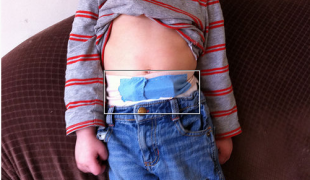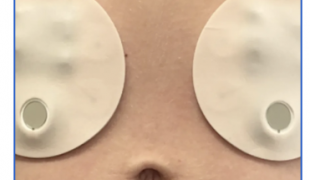- 7764
- 409
- 6
- 8
- 1
- Help Ukraine
About the solution
Because of her condition, Mariel is a quadriplegic and developmentally delayed. So she needs care around the clock.
According to her father, Mariel has been getting good care in special facilities. However, her diapers were changed according to caregivers’ schedules, not hers. Because of this, she regularly developed urinary infections and skin breakouts.
This led Jim to look for a solution. And that’s how CareChanger was born. It consists of a device with a wireless sensor tag used to monitor humidity in wine cellars and linked it to a computer tablet slung on the back of Mariel’s wheelchair and to his own phone. With this system, the caregivers can just look at the computer tablet and he can look at this phone and know whenever the patient needs a change.
According to the invention, the gadget works well because since it has been used, Mariel has been free of all related infections since the device went into use over two years.
The father had help from eleven engineering students from the UVic Biomedical Engineering Design Club.
This solution led the students to get second place in a Canadian national contest.
Jim is meeting with a technology and design firm to discuss developing the device further, possibly getting it into the market.
Adapted from: https://bit.ly/37jEDSc
This solution shall not include mention to the use of drugs, chemicals or biologicals (including food); invasive devices; offensive, commercial or inherently dangerous content. This solution was not medically validated. Proceed with caution! If you have any doubts, please consult with a health professional.
DISCLAIMER: This story was written by someone who is not the author of the solution, therefore please be advised that, although it was written with the utmost respect for the innovation and the innovator, there can be some incorrect statements. If you find any errors please contact the patient Innovation team via info@patient-innovation.com
-
-
634
-
0
-
9947

Mother creates Potty Training Belt for children with proprioceptive difficulties
(SELF)-CONTROL: URINARY CONTINENCE: Maintaining urinary continence
(SELF)-CARE: USING THE TOILET: Using the toilet independently
(SELF)-CONTROL: BOWEL CONTINENCE: Maintaining bowel continence
Autism
Strategy/Tip
Body-Worn solutions (Clothing, accessories, shoes, sensors...)
Anxiety
Difficulty concentrating or making decisions
Social withdrawal or isolation
Irritability or anger outbursts
Restlessness or feeling slowed down
Panic attacks
Difficulty controlling impulses
Racing thoughts
Obsessive thoughts or compulsive behaviors
Restoring mobility
Promoting self-management
Managing Neurological Disorders
To improve Treatment/Therapy
Raise awareness
Caregiving Support
Child and Adolescent Psychiatry
Neurology
Pediatrics
United States
-
-
-
729
-
0
-
18077

Glove to help control tremors
Grip
(SELF)-CARE: EATING: Eating independently.
(SELF)-CARE: DRINKING: Drinking independently.
Parkinson's Disease
Assistive Daily Life Device (to help ADL)
Body-Worn solutions (Clothing, accessories, shoes, sensors...)
Gait abnormalities (e.g., walking difficulties, unsteady gait)
Tremors
Muscle cramps or spasms
Difficulty coordinating movements
Muscle weakness
Cognitive impairment
Restoring mobility
Promoting self-management
Managing Neurological Disorders
Caregiving Support
Neurology
United Kingdom
-
-
-
339
-
0
-
3246

Caregiver Steve Axelrod creates EKG for the gut - a patch-based system is designed to read signals from the digestive tract.
(SELF)-CARE: HYGIENE: Maintaining personal hygiene
(SELF)-CARE: USING THE TOILET: Using the toilet independently
(SELF)-CONTROL: BOWEL CONTINENCE: Maintaining bowel continence
CAREGIVING
Chron's Disease
Inflammatory Bowel Disease
Assistive Daily Life Device (to help ADL)
Change in bowel habits
Bloating
Constipation or diarrhea
Promoting self-management
Enhancing digestive function
Preserving Organ Function
Restoring Skin Health
Alleviating Allergies
To improve Treatment/Therapy
Preventing (Vaccination, Protection, Falls, Research/Mapping)
Raise awareness
Caregiving Support
Gastroenterology
General and Family Medicine
General Surgery
Pediatrics
United States
-
 en
en
Alodia • Fri, 12/20/2019 - 17:09
I hope that when time comes we can really help and better understand children with special needs